This article was co-authored by Lisa Bryant, ND. Dr. Lisa Bryant is Licensed Naturopathic Physician and natural medicine expert based in Portland, Oregon. She earned a Doctorate of Naturopathic Medicine from the National College of Natural Medicine in Portland, Oregon and completed her residency in Naturopathic Family Medicine there in 2014.
This article has been viewed 193,181 times.
If you're worried about growing breast tissue as a man, you're not alone. Gynecomastia is a condition where males develop larger breast tissue due to a hormonal imbalance. It's normal to have gynecomastia during puberty that may go away on its own. Additionally, certain conditions and medications can cause it, including chemotherapy, radiation, steroids, alcohol, and marijuana. If you'd like, you may be able to treat it naturally with dietary and lifestyle changes. However, check with your doctor before treating yourself, if you develop severe symptoms, and if your medication may be causing your condition.
Steps
Making Dietary Changes
-
1Increase your iodine intake if your doctor recommends it. Iodine is necessary for the thyroid to produce hormones. Since gynecomastia is often due to a hormonal imbalance, adding more iodine to your diet may help. However, it's always a good idea to have your iodine level checked by your doctor first.
- To increase your iodine, make sure the salt you use has iodine and eat foods like fish, dairy, grains, and seaweed.[1]
-
2Eat enough to maintain a healthy weight to prevent a testosterone drop. If you are on a calorie-restricted diet, you can cause your testosterone levels to drop in relation to your estrogen levels. In turn, you can develop gynecomastia.[2] Make sure you are getting enough calories for your age. Most men need about 2,500 calories a day to maintain their weight, though that can change depending on your age and activity level.[3]
- Also, your nutrition is important, meaning your diet needs to consist of fruits and veggies, lean proteins, and whole grains.
Advertisement -
3Limit your alcohol intake to keep your hormones balanced. Alcohol can affect the balance of hormones in your body. It's best to skip alcohol altogether if you can. Otherwise, only drink in moderation, generally less than 1 to 2 drinks a day.[4]
Making Lifestyle Changes
-
1Ask your doctor if gynecomastia is a side effect of your medication. Some medications can cause gynecomastia. While it's not a good idea to go cold turkey off your medications, your doctor may be able to switch you over to a different medication that doesn't cause this problem for you.[5]
- Medications that may cause issues include antibiotics, AIDS medications, heart medications, anabolic steroids and androgens, anti-androgens, chemotherapy, and tricyclic antidepressants.
-
2Lose weight if you are obese. Obesity is strongly associated with gynecomastia. If you have a BMI above 25 kg/m, there's an 80% chance that you'll develop gynecomastia. In addition to eating a healthy diet, aim to exercise for 150 minutes per week. Aerobic exercise, in particular, can help you lose weight and reduce gynecomastia.
- Talk to your doctor or a registered dietitian about the best way for you to safely reach your goal weight.
-
3Skip illegal drug use. A number of illegal drugs or drugs used in illegal ways can increase your chances of developing gynecomastia. Some drugs that are potentially problematic include heroin, marijuana, steroids, and amphetamines.[6]
-
4Avoid products with plant oils because they can boost estrogen. Some plant oils, such as lavender oil or tea tree oil, may make this condition worse. They can affect estrogen levels in your body, so check for them in products such as lotions, shampoos, and soaps.[7]
-
5Consider a sports bra to smooth out your chest. Usually, gynecomastia is not an issue medically. In other words, it's not a threat to your health. If your main issue with it is cosmetic, you might consider wearing a sports bra under your undershirt to help create cleaner lines.
- Most sports bras come in standard sizes, such as small, medium, and large, rather than band size and cup sizes, which makes it easier for you to find one.
-
6Be patient because it takes time to see results. Gynecomastia will often go away on its own, particularly if you develop it as a teenager. Though you'll want to talk to your doctor about it, it's likely that they will suggest you wait it out. Often, it will decrease on its own within 3 years.[8]
-
7Pursue plastic surgery after medical issues have been eliminated. If there is no medical cause behind your gynecomastia, then you may consider having the extra tissue removed through plastic surgery. In recent years, plastic surgery has become more common among men, so it's a normal procedure.
- Ask your doctor for a recommendation about plastic surgery to determine if it's right for you.
When to Seek Medical Care
-
1Talk to your doctor to rule out health conditions. Your doctor can determine the underlying cause of your gynecomastia, which will help you better address your symptoms. Since some diseases can cause gynecomastia, it's important that you receive the right treatment with the help of a doctor. Once your doctor identifies the cause of your condition, you can choose the best treatment options for your needs.
- A few underlying conditions that your doctor can treat include Klinefelter syndrome, cystic fibrosis, ulcerative colitis, chronic kidney disease, thyroid disease, and liver problems.[9]
-
2Call your doctor if you develop other worrisome symptoms. While gynecomastia is normally nothing to worry about, it can sometimes be an indication of a more serious underlying problem. Let your doctor know right away if you have gynecomastia along with other symptoms, such as:[10]
- Swelling or tenderness in your breasts
- Pain in your breasts or nipples
- Discharge from one or both of your nipples
- Enlargement of just one breast or a hard lump inside either of your breasts, which may be a sign of breast cancer[11]
-
3Show your doctor the medications and supplements you’re taking. Since some medications and supplements can cause gynecomastia, it's important that your doctor knows exactly what you're taking. It's best to bring in the bottles, but you could also make a list.[12]
- Don't forget to write down the dosages!
-
4Undergo blood tests to identify any underlying conditions. A blood test can identify certain medical conditions, as well as medications in your blood that could cause the condition. This relatively easy diagnostic test is nearly painless and can be done in the office.[13]
- Your doctor will also use a blood test to check your testosterone levels, as low testosterone could contribute to gynecomastia.
- A blood test can rule out conditions like kidney disease or side effects of medication.
-
5Get a mammogram if your doctor recommends it. The doctor may refer you for a mammogram to determine the cause of your gynecomastia. Although you may think of mammograms as a test for women, they're actually for both genders. They help the doctor examine breast tissue on both men and women, which helps prevent and diagnose conditions like breast cancer.[14]
- You may experience a little discomfort during the mammogram.
-
6Agree to a biopsy if it's necessary for a diagnosis. If the doctor has difficulty identifying the cause of your gynecomastia, then they may want to get a sample of your breast tissue. They can examine this sample under the microscope to determine a potential cause. When the doctor does the biopsy, they will give you local anesthesia to make the procedure more comfortable.[15]
- You will likely experience some discomfort.
Expert Q&A
Did you know you can get expert answers for this article?
Unlock expert answers by supporting wikiHow
-
QuestionWhat creams are used to reduce gynecomastia?
 Lisa Bryant, NDDr. Lisa Bryant is Licensed Naturopathic Physician and natural medicine expert based in Portland, Oregon. She earned a Doctorate of Naturopathic Medicine from the National College of Natural Medicine in Portland, Oregon and completed her residency in Naturopathic Family Medicine there in 2014.
Lisa Bryant, NDDr. Lisa Bryant is Licensed Naturopathic Physician and natural medicine expert based in Portland, Oregon. She earned a Doctorate of Naturopathic Medicine from the National College of Natural Medicine in Portland, Oregon and completed her residency in Naturopathic Family Medicine there in 2014.
Licensed Naturopathic Physician
-
QuestionWill masturbating increase my gynecomastia?
 Lisa Bryant, NDDr. Lisa Bryant is Licensed Naturopathic Physician and natural medicine expert based in Portland, Oregon. She earned a Doctorate of Naturopathic Medicine from the National College of Natural Medicine in Portland, Oregon and completed her residency in Naturopathic Family Medicine there in 2014.
Lisa Bryant, NDDr. Lisa Bryant is Licensed Naturopathic Physician and natural medicine expert based in Portland, Oregon. She earned a Doctorate of Naturopathic Medicine from the National College of Natural Medicine in Portland, Oregon and completed her residency in Naturopathic Family Medicine there in 2014.
Licensed Naturopathic Physician
-
QuestionWhat medicine causes breast enlargement in men?
 Lisa Bryant, NDDr. Lisa Bryant is Licensed Naturopathic Physician and natural medicine expert based in Portland, Oregon. She earned a Doctorate of Naturopathic Medicine from the National College of Natural Medicine in Portland, Oregon and completed her residency in Naturopathic Family Medicine there in 2014.
Lisa Bryant, NDDr. Lisa Bryant is Licensed Naturopathic Physician and natural medicine expert based in Portland, Oregon. She earned a Doctorate of Naturopathic Medicine from the National College of Natural Medicine in Portland, Oregon and completed her residency in Naturopathic Family Medicine there in 2014.
Licensed Naturopathic Physician
References
- ↑ https://ods.od.nih.gov/factsheets/Iodine-Consumer/
- ↑ https://www.mayoclinic.org/diseases-conditions/gynecomastia/symptoms-causes/syc-20351793
- ↑ https://www.nhs.uk/chq/pages/1126.aspx?categoryid=51
- ↑ https://www.mayoclinic.org/diseases-conditions/gynecomastia/symptoms-causes/syc-20351793
- ↑ https://www.mayoclinic.org/diseases-conditions/gynecomastia/symptoms-causes/syc-20351793
- ↑ https://www.mayoclinic.org/diseases-conditions/gynecomastia/symptoms-causes/syc-20351793
- ↑ https://www.mayoclinic.org/diseases-conditions/gynecomastia/symptoms-causes/syc-20351793
- ↑ https://familydoctor.org/condition/gynecomastia/
- ↑ https://www.mayoclinic.org/diseases-conditions/gynecomastia/symptoms-causes/syc-20351793
- ↑ https://www.mayoclinic.org/diseases-conditions/gynecomastia/symptoms-causes/syc-20351793
- ↑ https://www.mayoclinic.org/diseases-conditions/gynecomastia/diagnosis-treatment/drc-20351799
- ↑ https://www.mayoclinic.org/diseases-conditions/gynecomastia/diagnosis-treatment/drc-20351799
- ↑ https://www.mayoclinic.org/diseases-conditions/gynecomastia/diagnosis-treatment/drc-20351799
- ↑ https://www.mayoclinic.org/diseases-conditions/gynecomastia/diagnosis-treatment/drc-20351799
- ↑ https://www.mayoclinic.org/diseases-conditions/gynecomastia/diagnosis-treatment/drc-20351799
About This Article
Gynecomastia is a condition where males develop larger breast tissue due to a hormonal imbalance. To reduce this naturally, eat foods that are high in iodine, like fish, dairy, grains, and seaweed. Avoid alcohol and illicit drugs, which can upset your hormone balance. You should also try to exercise for 150 minutes a week, which can help you stay in shape and limit the size of your breasts. Gynecomastia normally goes away over time, so try to be patient if you’re not seeing immediate results. However, if you’re taking other medications, talk to your doctor about them, since some drugs can contribute to gynecomastia. For more tips from our Medical co-author, including how to pursue plastic surgery to reduce your breast tissue, read on.


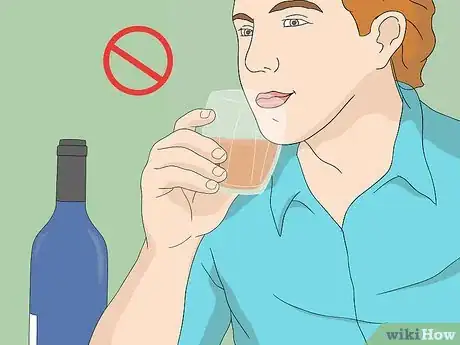
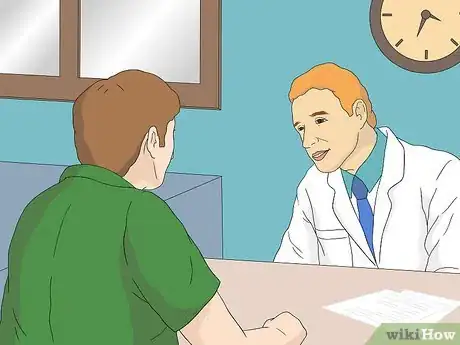
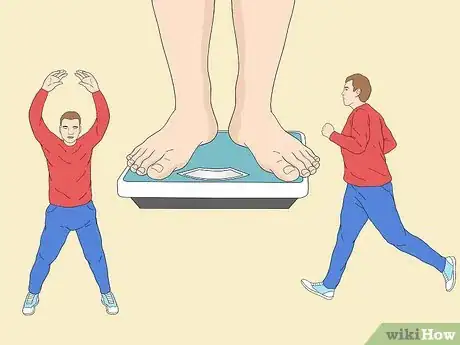
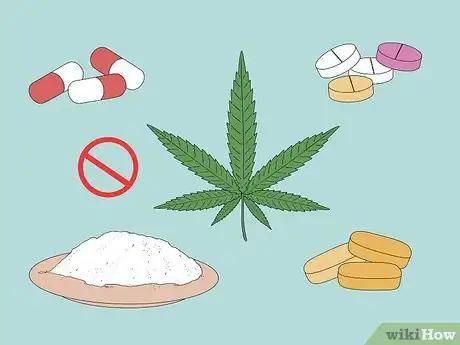



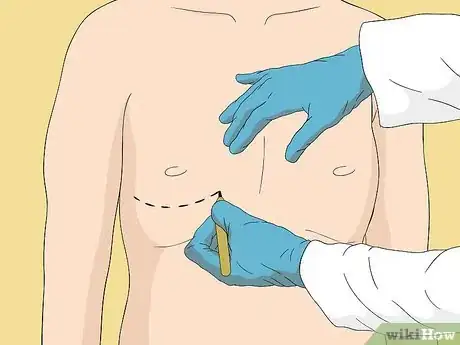
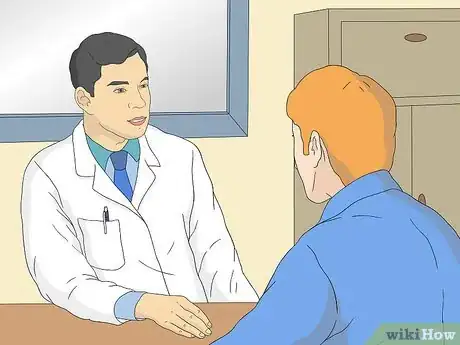


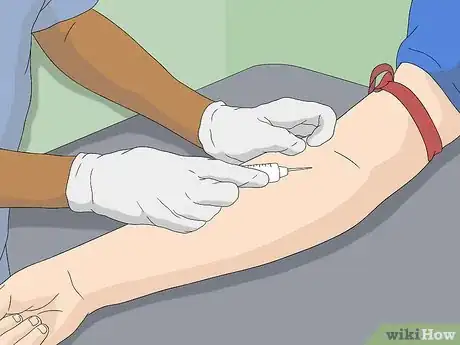
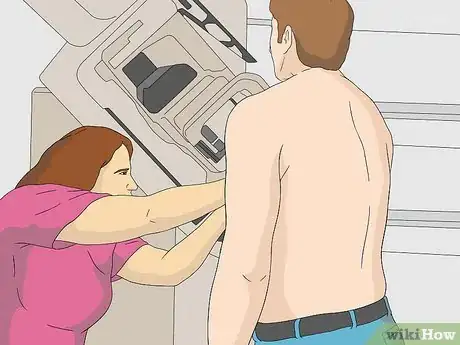
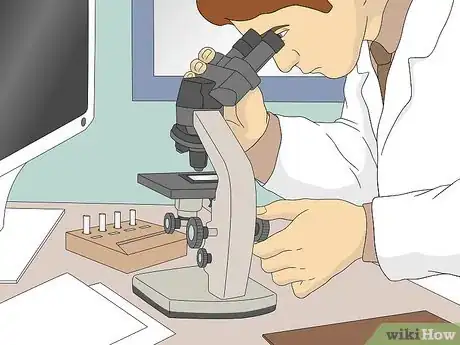
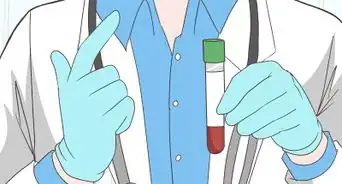
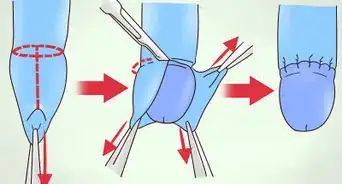

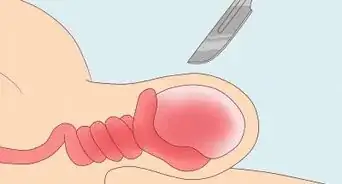




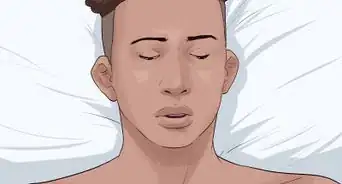
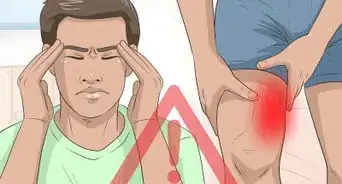
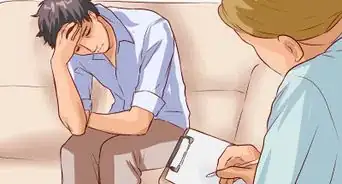


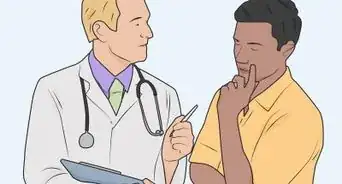







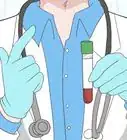
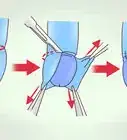
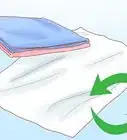
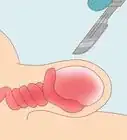



































Medical Disclaimer
The content of this article is not intended to be a substitute for professional medical advice, examination, diagnosis, or treatment. You should always contact your doctor or other qualified healthcare professional before starting, changing, or stopping any kind of health treatment.
Read More...